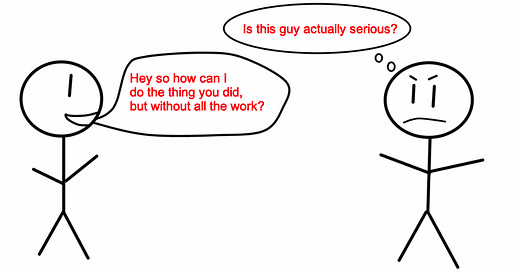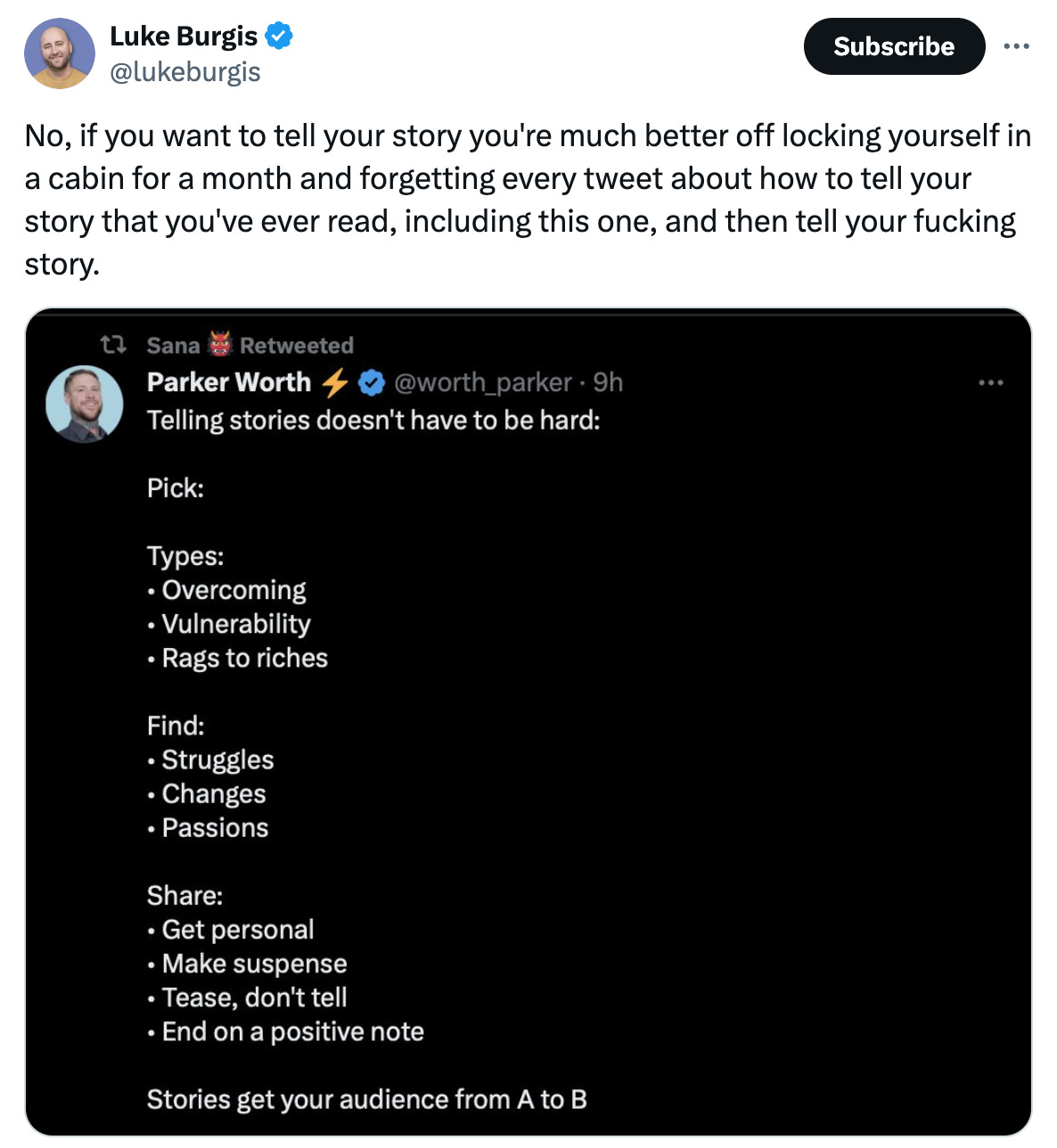Welcome to Young Money! If you’re new here, you can join the tens of thousands of subscribers receiving my essays each week by adding your email below.
On November 17th, 2021, I hit my first real milestone as a writer: 1,000 email subscribers. To commemorate this achievement, I decided to tweet out a screenshot showing my progress, accompanied by the caption, “Not there yet, but getting somewhere.”
This became the first of an ongoing series of publicly shared progress updates. Last week, after crossing the 30,000 subscriber mark, I tweeted the 19th installment, once again captioned, “Not there yet, but getting somewhere.”
This has been a fun “building in public” experiment, and if you work backward from the most recent tweet, you will see just how long it took me to hit each milestone over the last ~14 months. More importantly, you can see how my growth has accelerated over time.
Now, I have not “made it” by any means, but I have achieved some level of success in this writing game. And the funny thing about achieving some level of success is that an ever-increasing number of folks now hit me up with the same questions:
“How do I scale my blog?”
“How do I get more people to read my content?”
“How do I grow my audience? Do you have any growth hacks?”
While I do have some tips that help, including, but not limited to: crafting a strong welcome email, building a network on Twitter and/or Linkedin, and always responding to your readers’ emails, the real answer is much simpler:
In the last 18 months, between Young Money and my travel blog, I have published 200 blog posts, averaging 2,300 words each, for a total of approximately 460,000 words.
And if you do something 200 times, it’s pretty difficult not to find some level of success. But no one wants to hear that growth hack, because it isn’t a growth hack. It’s boring. Tedious. Difficult. Time-consuming. It’s not efficient.
That’s a feature, not a flaw.
The world we live in today believes efficiency is the paramount metric by which all things should be judged. And this thirst for “efficiency” means that fewer people want to know “How do I create good work?” and everyone wants to know “How do I achieve results as quickly as possible?” The desire for quality has been replaced by a search for speed, and we’re not better because of it.
As I sat here on this fine Monday night, racking my brain to conjure Tuesday morning’s blog post, I came across this Luke Burgis tweet that perfectly encapsulated how I’ve felt about a lot of this stuff for a while now.
Warning: language!
Luke is an author and modern-day philosopher, and his book, Wanting, is one of the best pieces of literature to be published in the 2020s. So yes, Luke knows a thing or two about writing, and I echo his sentiment in the above tweet.
Writing, or at least good writing, isn’t some “game” to be hacked. It doesn’t abide by some fill-in-the-blank formula that the writer needs to solve. Good writing is an art. And good writing isn’t supposed to be easy.
This cookie-cutter Madlibification of “storytelling” is just the latest installment of hustle culture gone wrong.
The era of sabermetrics and analytics and efficiency-over-everything has created a widespread desire to achieve results as quickly as possible without putting in the reps, but that’s just not how this whole thing works.
Let me give you a “mental model” for how to write something actually worth writing.
You sit down at your computer, open a new word document, and start to write. And then you proceed to write for hours on end. You’ll get stuck, you’ll struggle to find the specific word or phrase that best expresses how you feel, and you’ll delete entire paragraphs that you just spent 45 minutes writing. You don’t follow a ten-point checklist to ensure that you completed X number of “storytelling points.” You just write your story, frameworks be damned.
Then, when you complete the draft, you read over your work. And your work is going to suck. So you begin revising. And in this revision process, you’re going to delete mercilessly. You cut out 25% of the content that you just finished agonizing over. You realize that the 14th paragraph actually works better if it follows the 3rd paragraph, and a supporting detail soon becomes the main point of your story. By the time you’re finished with the revision process, your final draft is almost unrecognizable from the first draft.
But that’s just how writing works.
When you try to “solve” writing, you remove the human element from your work. A 1-2-3 approach to the writing process may help you produce something, but it isn’t going to connect with your audience. That connection is built through raw transparency, humor, and anecdotes, not some checklist.
You have to sit down and do the work.
This prioritization of efficiency hasn’t just impacted writing; it is a cancer that has metastasized everywhere. In the post-Money Ball era, baseball teams, chasing probabilities and statistical advantages, optimize for home runs and strikeouts over everything else. As a result, the pace of play has slowed to a crawl, and the entertainment value of “America’s Pastime” has fallen off a cliff.
Centuries-old European cities, built before the era of automobiles, have urban centers with beautiful bridges, towers, and winding, cobblestone streets. Gothic, Renaissance, and Baroque architecture have made these cities more than just places to live and work; they are expressions of art itself.
Contrast this image of Prague with the vast, urban sprawl that is Los Angeles, with its grid-like planning and homogenous homes.
You get the idea. Efficiency isn’t free, and it comes at the cost of expression. And that tradeoff is often more expensive than you’d think. Expression is unique; it makes us human. And expression is difficult because it often involves doing, building, or creating something that hasn’t been done, built, or created before.
There’s no blueprint for original work, but that’s why it’s so memorable. Expression isn’t some problem meant to be solved and discarded.
It’s not supposed to be easy.
- Jack
I appreciate reader feedback, so if you enjoyed today’s piece, let me know with a like or comment at the bottom of this page!
Young Money is now an ad-free, reader-supported publication. This structure has created a better experience for both the reader and the writer, and it allows me to focus on producing good work instead of managing ad placements. In addition to helping support my newsletter, paid subscribers get access to additional content, including Q&As, book reviews, and more. If you’re a long-time reader who would like to further support Young Money, you can do so by clicking below. Thanks!
Jack's Picks
I just started reading Paul Millerd’s book, The Pathless Path, last night, and so far it has been a fascinating story about Paul’s journey from climbing the corporate ladder to dropping everything in pursuit of a more authentic life.
Eli Dourado published an interesting piece about the possibility of cargo airships making a comeback in the near future.







